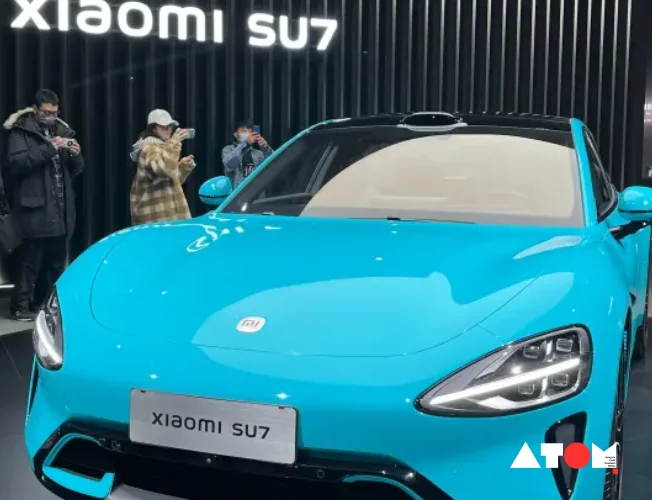Xiaomi, the massive Chinese electronics company, is generating news in India with its most recent entry into the electric vehicle (EV) sector. Like its fellow countrymen BYD and MG Motors, Xiaomi has stealthily introduced its recently launched electric vehicle, the SU7, to the Indian market. This car will be on display in Bengaluru for the benefit of the company’s associates, staff, and general public.
The SU7: A Closer Look
The SU7, short for Speed Ultra, is a flagship project of Xiaomi CEO Lei Jun. Priced under $30,000 (approximately INR 25 lakh) for the base model, it is significantly cheaper than the base model of Tesla’s Model 3 in China, which costs around $34,000 (approximately INR 28.3 lakh). This pricing strategy could make the SU7 a competitive option in the burgeoning EV market.
The SU7 comes in two versions: one with a driving range of up to 611 km on a single charge and another with a range of up to 800 km. This impressive range positions the SU7 as a strong contender in the global EV market, where range anxiety remains a significant concern for potential buyers.
Xiaomi’s Strategic Move
Although there have been rumors of an imminent Indian launch due to Xiaomi’s choice to display the SU7 there, the firm has said that it has “no plans” to do so. Rather, Xiaomi is concentrating on its core product lines for India and is still “evaluating market opportunities.”
A corporate spokeswoman stated, “We continue to watch market opportunities, but our primary focus is on our core product lines for India.” Xiaomi’s objective of achieving market readiness prior to making a full-scale debut into the Indian automotive sector is highlighted by this cautious approach.
Display in Bengaluru
The display event in Bengaluru is part of Xiaomi’s celebration of a decade of business in India. The company plans to showcase the SU7 along with a range of household appliances, emphasizing Xiaomi’s diversified product portfolio beyond smartphones, which currently dominate its consumer product lineup.
“The idea is to showcase the strength of Xiaomi as a brand and its diversified product portfolio,” a source told TOI. “The car will be on display, and the company plans to showcase a number of household appliances and even announce its entry into newer categories,” the source added.
Market Dynamics
In the current high-interest-rate environment, many are curious about Xiaomi’s strategic timing for introducing an electric vehicle in India. Some industry experts believe that this could be a precursor to Xiaomi’s future plans to tap into the Indian car market. However, others suggest that it may be “too early” for Xiaomi to consider India as one of the early markets for the vehicle, given that deliveries began in China only in March.
Xiaomi’s entry into the EV market aligns with its broader strategy of expanding its product ecosystem. With an investment of $40 billion into its global foray into the automotive sector, Xiaomi is betting big on the future of electric mobility. The company aims to leverage its expertise in electronics and technology to create innovative and affordable EV solutions.
Challenges and Opportunities
Despite the excitement surrounding Xiaomi’s electric vehicle, the company faces significant challenges. The Indian EV market is still in its nascent stages, with infrastructure and regulatory hurdles to overcome. Moreover, established players like Tata Motors, MG Motors, and Hyundai have already made significant inroads into the market.
However, Xiaomi’s brand recognition and technological prowess could give it an edge. The company’s success in the smartphone market has demonstrated its ability to deliver high-quality products at competitive prices. If Xiaomi can replicate this success in the EV market, it could become a major player in India’s automotive landscape.
Additionally, Xiaomi’s focus on household appliances and other consumer electronics highlights its strategy of creating a comprehensive ecosystem of interconnected devices. This approach could attract tech-savvy consumers looking for integrated solutions that enhance their lifestyle.
Future Prospects
As Xiaomi continues to explore opportunities in the Indian market, its cautious approach to the launch of the SU7 suggests that the company is taking the time to understand local market dynamics and consumer preferences. This strategic patience could pay off in the long run, allowing Xiaomi to make a well-timed entry into the market with a product that meets the needs and expectations of Indian consumers.
Xiaomi’s showcase of the SU7 electric vehicle in India marks an exciting development for both the company and the Indian automotive market. While the launch date remains uncertain, the event in Bengaluru will provide valuable insights into consumer interest and market potential. As Xiaomi celebrates a decade of success in India, its foray into the EV market could herald a new era of innovation and competition in the country’s automotive sector.
Read more: Marketing News, Advertising News, PR and Finance News, Digital News





